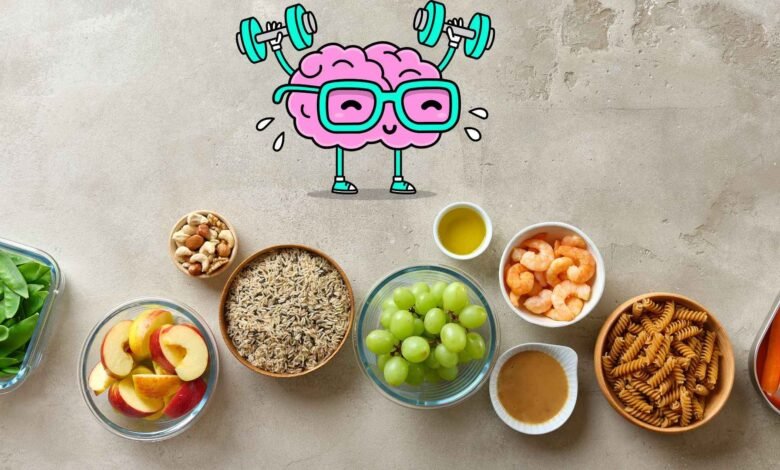Diet and Mental Health | Top 7 Foods For Eat to Beat Depression and Anxiety

How can you eat to beat depression and anxiety?
A healthy diet and mental health are so connected that, According to different research and health surveys, the risk to develop a mental health problem could start at an age as young as 14 and is directly related to eating habits. Continuous research has been going on to find out what to eat to beat depression and anxiety.
The risk of depression increases by about 80%in persons who enjoy fast foods and unhealthy calories as compared to healthy eaters, so definitely diet affects mental health.
According to the International Society for Nutritional Psychiatry Research. “A healthy diet is protective, and an unhealthy diet is a risk factor for depression and anxiety.” So, diet and depression go side by side in human communities.
Mental health advisors recommend different foods to eat to beat depression and anxiety because a Good diet and mental health are very much dependent on each other. A good diet and exercise for mental health are as important as oxygen is for breathing.
TOP 7 FOODS GOOD FOR MENTAL HEALTH
Studies don’t agree with only dietary management of depression and anxiety, but they do show that it plays a very important role in day-to-day mood management and coping with mental fatigue. And studies do show that good foods lead to good mental health. So, we need to get to know the foods good for mental health.
1. Food rich in Minerals
Minerals such as Zinc and Magnesium are important for the balanced production of neurotransmitters(serotonin and Dopamine) that keep the mood and emotions in check. For zinc, it is often stated that decreased levels of zinc directly increase the chances of depression and its major food source is oysters. Sources of magnesium include dark chocolate, cacao nibs, almonds and cashews, spinach, and other dark leafy greens, bananas, and beans.
2. Complex carbohydrates
Complex carbohydrates and a diet full of fibers keep a person full and satisfied for a longer period elevating mood and a sense of satisfaction. Foods such as vegetables, Fruits, and Brown rice are healthier as compared to straight in sugars and candies so are among the foods to eat for depression and anxiety management.
3. Lean proteins
Lean proteins are good for brain development and effective nerve conduction as they are for building muscles. A healthy body always needs a sound mind and that comes by developing harmony between a healthy diet and mental health. Protein sources such as chicken, lean meat, fish, eggs, beans, and nuts are major contributors to amino acids needed to regulate mood.
4. Good fats
Processed foods and trans fats are as bad for mental health as for physical and are among the worst foods for mental health.
Intake of food with good fats such as olive oil, rapeseed oil, fish, milk, egg, and avocado oil help maintain good mental activity and elevation a good mood.
5. Vitamins-rich diet
Vitamin b12 is an important component in keeping brain cells and nerves healthy. Metal fatigue and mood changes are major outcomes if a person is deficient in vitamin b12. Common sources include Red meat, milk, eggs, fish, and cereals.
Vitamin D regulates serotonin production so is a very important component of foods for depression cure. The major source is sunlight and other dietary sources include milk, sardines, beef liver, mushrooms, and other dairy products.
6. Foods full of Antioxidants
Anti-oxidants are good for normal nerve conduction and mental health so the person looking to improve mental health should incorporate foods that contain anti-oxidants e.g. berries, green leafy vegetables, black chia seeds, dark chocolate, turmeric, etc.,
7. Selenium-rich foods
Studies show shreds of evidence that low body selenium levels are directly related to poor mood. The normal daily recommended intake for selenium is 55mg. supplements can also be used to fulfill that requirement but that could lead to overdoses so try to fill up with foods rich in selenium such as Seafood, beans & legumes, lean meat, whole grains, and low-fat dairy products.
Good Mental Health Food Platter

According to the American dietetic association diet containing fruits, vegetables, nuts, beans, legumes, lentils, and salmon is the best diet for mental health.
So, the Effective use of good food for depression and anxiety management is equally important as to use of medication, and Diet plan to boost mental health must include the following
- Complex carbs and Fibers
- Good Fats
- Lean proteins
- Source of antioxidants
- Source of vitamins and Minerals
Good dietary routine to boost mental health
- eat regularly in small portions so sugar levels don’t drop.
- drink to stay hydrated so you don’t face mental fatigue
- incorporate good fats into your diet.
- Avoid trans fats
- Take your proteins
- maintain good gut health by eating veggies, fruits, and probiotics
- cut down caffeine intake, it will help manage sleep problems.
- Share your meals it will uplift your mood.
- avoid foods that deteriorate your mental strength i.e. cigarettes, alcohol, processed fats, and a lot of caffeine.
Diet Without medication for Anxiety and Depression Management
Diet alone might not be enough if a person is severely affected by emotional setbacks and anxiety, but still consuming foods good for mental health improve medical outcomes because there’s a definite link between a healthy diet and mental health. Complete stoppage of medication might only be done after a session with your medical health advisor.
Conclusion
So the diet alone might not be enough to manage anxiety and depression but healthy eating and a good diet plan improve mental health and might prolong the onset of mental illness. A healthy diet and mental health are as related as diet and physical health.



